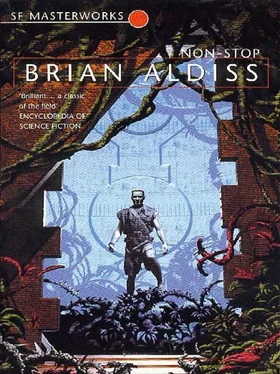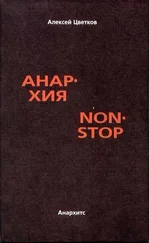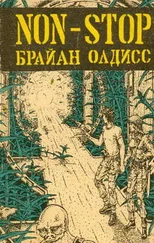Work on the job commenced at once. Volunteers flocked to Scoyt’s aid, willing to do anything they could to help. Human chains worked feverishly, passing back every movable item on the doomed deck to others who smashed it or, if smashing were not possible, flung it into other vacant rooms. Ahead of the chain, sweating warriors, many of them Gregg’s men, who had experience of such tasks, attacked the ponics, hacking them down, rooting them up; just behind them came the clearance men, looting, gutting and filleting the place.
And so as soon as a room was cleared, Master Scoyt himself came with the heat gun, blazing round the sides of the walls till the walls came tumbling down; they were carted off directly they were cool enough to touch. The laser did not melt the plastic which actually divided deck from deck — that metal was the same, evidently, as the metal of which the air lock doors were built, something extra tough — but everything else fell away before it.
Soon after the work began, a rat hideout was discovered in a big room marked ‘Laundry’. Splitting open a boiler, two of Gregg’s men revealed a crazy little maze of rat buildings, a rodent village. Different levels and flights of a bewildering complexity of design had been constructed inside the boiler from bones and rubble and cans and filth. There were tiny cages here containing starving creatures, mice, hamsters, rabbits, even a bird; there were moths living here, rising up in a storm; and there were the rats, in nurseries and studs and armouries and slaughter houses. As Scoyt thrust the heat gun into the miniature city and it crackled up in flames, the rodents poured out savagely, leaping to the attack.
Scoyt saved himself with the gun, warding them off as he fell back. Gregg’s two men had their throats bitten through before reinforcements could dash up with dazers and beat off the little furies. The bodies went back along the human chain, and demolition continued.
By now, the corridors of decks 24 to 13 had been completely stripped of trap-doors on all three levels. Each hole was guarded.
‘The ship is rapidly becoming uninhabitable,’ Councillor Tregonnin protested. ‘This is destroying for destroying’s sake.’
He was presiding over a meeting to which everyone of importance had been called. Councillors Billyoe, Dupont and Ruskin were present. Pagwam and other officers of the Security Team were present. Gregg and Hawl were present. So were Complain and Vyann. Even Marapper had managed to wangle his way in. Only Scoyt and Zac Deight were missing.
By the messengers which had been despatched to bring him to the meeting, Scoyt had sent back word that he was ‘too busy’. Marapper, going down at Tregonnin’s request to fetch up Zac Deight, had returned to say simply that the councillor was not in his rooms; at that, Complain and Vyann, who now knew of Deight’s sinister part in affairs, exchanged glances but said nothing. It would have been a relief to burst out with the news that Deight was a traitor — but might there not be other traitors here, whom it would be wiser not to warn?
‘The ship must be pulled apart before the Giants pull us apart,’ Hawl shouted. ‘That’s obvious enough; why make an issue of it?’
‘You do not understand. We shall die if the ship is pulled apart!’ Councillor Dupont protested.
‘It would get rid of the rats, anyway,’ Hawl said, and cackled with laughter.
Right from the start, he and Gregg were quietly at loggerheads with the members of the Council; neither side liked the other’s manners. The meeting was disorganized for another reason: nobody could decide whether they wanted most to discuss the steps Scoyt was taking or the discovery of the strange planet.
At last, Tregonnin himself tried to integrate these two facets of the situation.
‘What it amounts to’, he said, ‘is this. Scoyt’s policy can be approved if it succeeds. To succeed, not only must the Giants be captured but, when captured, they must be able to tell us how to get the ship down on to the surface of this planet.’
There was a general murmur of agreement at this.
‘Obviously, the Giants must have such knowledge,’ Billyoe said, ‘since they built the ship in the first place.’
‘Then let’s get on with it, and go and give Scoyt some support,’ Gregg said, standing up.
‘There is just one other thing I would like to say before you go,’ Tregonnin said, ‘and that is, that our discussion has been on purely material lines. But I think we have also moral justification for our action. The ship is a sacred object for us; we may destroy it only under one condition: that the Long Journey be done. That condition, happily, is fulfilled. I am confident that the planet some of you have seen beyond the ship is Earth.’
The pious tone of this speech brought derision from Gregg and some of the Survival Team. It brought applause and excitement from others. Marapper was heard to exclaim that Tregonnin should have been a priest.
Complain’s voice cut through the uproar.
‘The planet is not Earth!’ he said. ‘I’m sorry to disappoint you, but I have certain information the rest of you do not know. We must be far away from Earth — twenty-three generations have passed on this ship: Earth should have been reached in seven!’
He was besieged by voices, angry, pitiful and demanding.
He had decided that everyone ought to know and face the situation exactly as it was; they must be told everything — about the ruined controls, about Captain Gregory Complain’s journal, about Zac Deight. They must be told everything — the problem had grown far too urgent for any one man to cope with it. But before he could utter another word, the door of the council chamber was flung open. Two men stood there, faces distorted with fear.
‘The Giants are attacking!’ they shouted.
Stinking, blinding, smoke coiled through the decks of Forwards. The piled rubbish evacuated from Deck 25 on to Decks 24 and 23 had been set alight. Nobody cared; everyone was suddenly a pyromaniac. Automatic devices throughout most of the ship had a simple way of coping with outbreaks of fire: they closed off the room in which the fire began and exhausted the air from it. Unluckily, this fire was started in a room where the devices had failed, and in the open corridors.
Scoyt and his fellow destroyers worked on uncomplainingly in the smoke. An impartial observer, seeing these men, would have known that an inner fury possessed them; that a life-long hatred of the ship which imprisoned them had at last found expression and was working itself out with uncheckable force.
The Giants struck cleverly.
Scoyt had just burnt round one wall of a small washroom and was resting while three of his men removed the wall, so that it shielded him momentarily from the view of the others. At that instant, the grille overhead was whipped away, and a Giant fired a gas pellet at Scoyt. It caught the Master in the face. He collapsed without a sound.
A cord ladder snaked down from the grille. One of the Giants skipped down it and seized the heat gun from Scoyt’s limp grasp. As he did so, the severed wall toppled over on top of him and stunned him: the three handlers had been careless and did not mean to let it go. They stared in utter surprise at the Giant. As they did so, three more Giants dropped down the ladder, fired at them, picked up their mate and the heat gun and attempted to get back to safety.
Despite the smoke, other people had seen this foray. One of Gregg’s ablest assassins, a fellow called Black, sprang forward. The hindmost Giant, who had just reached the grille, came crashing down again with a knife stuck in his back; the heat gun rolled from his grasp. Shouting for assistance, Black retrieved his knife and bounded up the ladder. He, too, fell back to the floor with a face full of gas. Others were behind him. Jumping him, they pressed on, swarming up the ladder and through the grille.
Читать дальше










